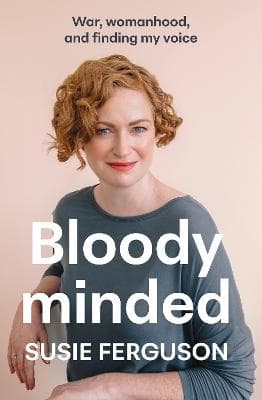Review: Bloody Minded, by Susie Ferguson
Reviewed by Claire Williamson
RNZ journalist Susie Ferguson lays bare her violent experiences as a war correspondent – and her equally violent experiences of coming to grips with her severe endometriosis – in her first book, Bloody Minded: War, Womanhood and Finding My Voice.
It’s a gripping, page-turning memoir, both due to Ferguson’s incredible career, but also due to her grasp of what makes a compelling story: drama, a touch of humour, and a theme to tie it all together. In this case, it’s how the bodies of women are as much a battlefield as an actual war zone.
Ferguson sets the scene with her childhood in Scotland. She’s quick-witted and keen, and is surrounded by a loving and supportive family. Things start to change, as they often do, with puberty. When Ferguson’s period begins, she’s crippled with blinding, awful pain and heavy bleeds – concerns multiple doctors hand-wave away. So Ferguson pops painkillers and soldiers on.
“I assumed there was nothing else that could be done. No medical specialist seemed particularly worried. People said, ‘It’s part of being a woman.’ … If this was it, if this was my lot, I might as well get on with it.”
When a particularly nasty streak of bullying at school almost derails her academics entirely, Ferguson finds a refuge in theatre. It’s where we see her start to find confidence – and some stalwart friends at last. Recollections of a brief period teaching at Eton – including snapping at a youthful Prince William to stop getting sawdust on her backdrop – are a breath of levity. But – of course – Ferguson’s still-undiagnosed pain simmers, then erupts. She learns she has a cyst on one ovary, and undergoes surgery to remove it, leaving her with a ropey scar across her belly. It’s not her last traumatic medical procedure.
Ferguson is still suffering through daily, agonising pain when she begins her journalism career as a radio broadcaster (and also her relationship with her now-husband, Lee). In 2003 Ferguson gets the opportunity to cover the conflict on-the-ground in Iraq, tagging along with a squad of soldiers, juggling shrapnel vests and sleeping in tents in the dust while managing her constant pain. The experience reshaped the trajectory of her next six years, which took her everywhere from Afghanistan to Indonesia. Again, the body is a focal point for Ferguson, her lived experiences literally carved into her skin.
“I gazed at my body in the mirror, reacquainting myself with myself,” she wrote after her first return from Iraq. “I was still pale and milky, dissected by the angry pink slash of the scar on my tummy, but it was like I was seeing it for the first time. I felt remade, the war having crept under my skin and into my soul. It jarred that there was nothing else to see.”
The last third of the book is where Ferguson pivots to describing her frankly horrifying journey to getting her endometriosis formally diagnosed and the conception and birth of her two children. Her recollections of being dismissed, ignored and swept under the rug by medical professionals in both the UK and in Aotearoa New Zealand make the blood boil. Ferguson’s description of her pain is visceral; yet there’s a dark humour to her prose illustrating how out-of-touch the doctors are:
“The medical advice was that the miscarriage would be like a bad period – I’m not sure what that’s meant to mean when all your periods are bad. My body’s violence was shocking, out of control. The cramping was vice-like in its grip, cold and grinding, the blood alarmingly crimson, at once glorious and stark.”
Through Bloody Minded, Ferguson is unflinching – but also vulnerable, able to reflect on her experiences without self-pity. This is a memoir that will open eyes to the realities of many people suffering from endometriosis – and required reading for anyone going into a medical profession.
Reviewed by Claire Williamson
